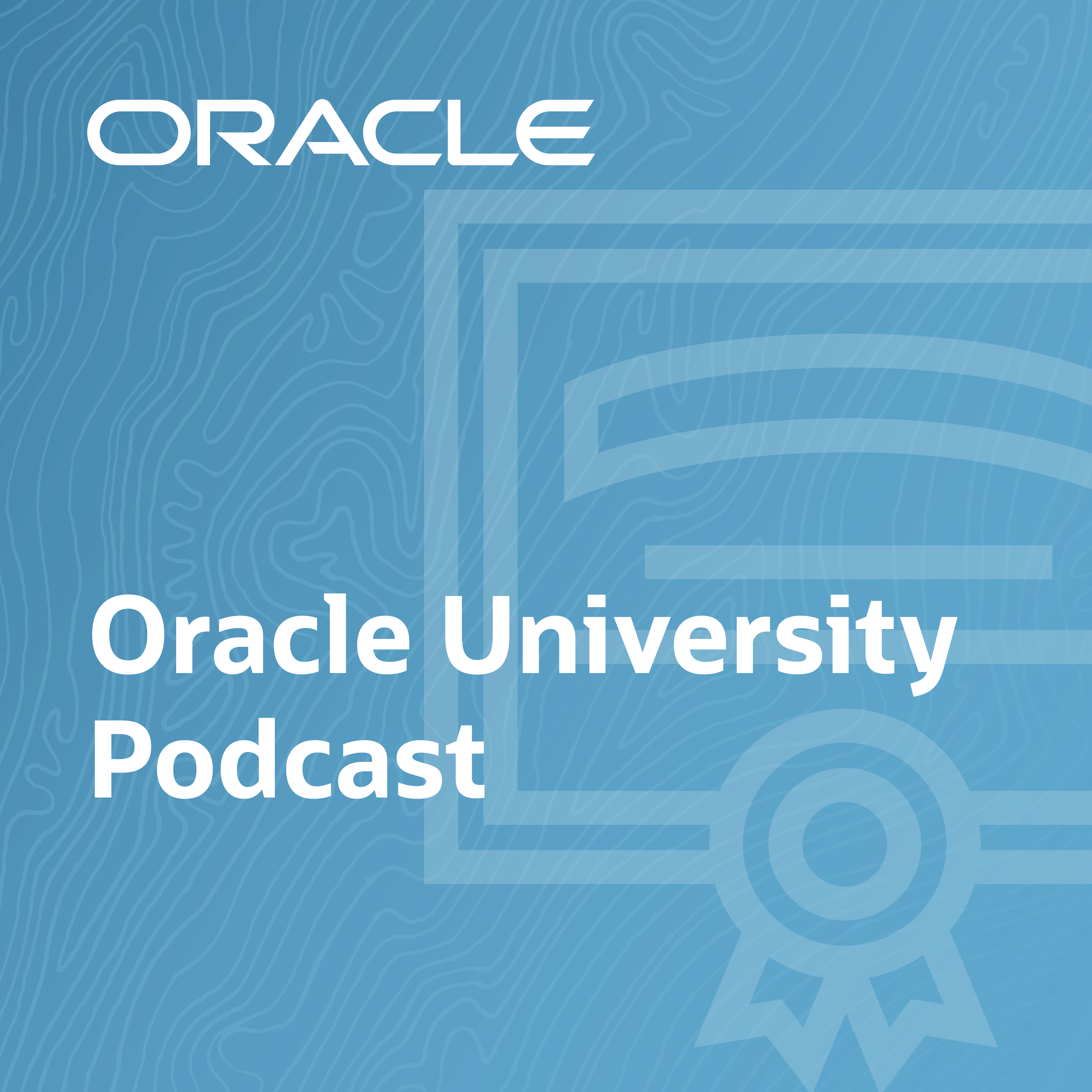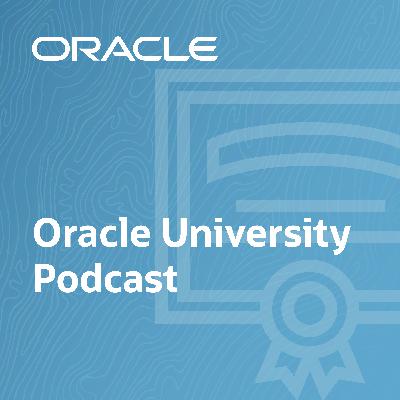What is Oracle GoldenGate 23ai?
Description
---------------------------------------------------------------
Welcome to the Oracle University Podcast, the first stop on your cloud journey. During this series of informative podcasts, we’ll bring you foundational training on the most popular Oracle technologies. Let’s get started!
Nikita: Welcome to the Oracle University Podcast! I’m Nikita Abraham, Team Lead: Editorial Services with Oracle University, and with me is Lois Houston: Director of Innovation Programs.
Lois: Hi everyone! Welcome to a new season of the podcast. This time, we’re focusing on the fundamentals of Oracle GoldenGate. Oracle GoldenGate helps organizations manage and synchronize their data across diverse systems and databases in real time.
And with the new Oracle GoldenGate 23ai release, we’ll uncover the latest innovations and features that empower businesses to make the most of their data.
Nikita: Taking us through this is Nick Wagner, Senior Director of Product Management for Oracle GoldenGate. He’s been doing database replication for about 25 years and has been focused on GoldenGate on and off for about 20 of those years.
Lois: In today’s episode, we’ll ask Nick to give us a general overview of the product, along with some use cases and benefits. Hi Nick! To start with, why do customers need GoldenGate?
Nick: Well, it delivers continuous operations, being able to continuously move data from one database to another database or data platform in efficiently and a high-speed manner, and it does this with very low overhead. Almost all the GoldenGate environments use transaction logs to pull the data out of the system, so we're not creating any additional triggers or very little overhead on that source system.
GoldenGate can also enable real-time analytics, being able to pull data from all these different databases and move them into your analytics system in real time can improve the value that those analytics systems provide. Being able to do real-time statistics and analysis of that data within those high-performance custom environments is really important.
Nikita: Does it offer any benefits in terms of cost?
Nick: GoldenGate can also lower IT costs. A lot of times people run these massive OLTP databases, and they are running reporting in those same systems. With GoldenGate, you can offload some of the data or all the data to a low-cost commodity hardware where you can then run the reports on that other system. So, this way, you can get back that performance on the OLTP system, while at the same time optimizing your reporting environment for those long running reports.
You can improve efficiencies and reduce risks. Being able to reduce the amount of downtime during planned and unplanned outages can really make a big benefit to the overall operational efficiencies of your company.
Nikita: What about when it comes to data sharing and data security?
Nick: You can also reduce barriers to data sharing. Being able to pull subsets of data, or just specific pieces of data out of a production database and move it to the team or to the group that needs that information in real time is very important.
And it also protects the security of your data by only moving in the information that they need and not the entire database. It also provides extensibility and flexibility, being able to support multiple different replication topologies and architectures.
Lois: Can you tell us about some of the use cases of GoldenGate? Where does GoldenGate truly shine?
Nick: Some of the more traditional use cases of GoldenGate include use within the multicloud fabric. Within a multicloud fabric, this essentially means that GoldenGate can replicate data between on-premise environments, within cloud environments, or hybrid, cloud to on-premise, on-premise to cloud, or even within multiple clouds. So, you can move data from AWS to Azure to OCI.
You can also move between the systems themselves, so you don't have to use the same database in all the different clouds. For example, if you wanted to move data from AWS Postgres into Oracle running in OCI, you can do that using Oracle GoldenGate. We also support maximum availability architectures. And so, there's a lot of different use cases here, but primarily geared around reducing your recovery point objective and recovery time objective.
Lois: Ah, reducing RPO and RTO. That must have a significant advantage for the customer, right?
Nick: So, reducing your RPO and RTO allows you to take advantage of some of the benefits of GoldenGate, being able to do active-active replication, being able to set up GoldenGate for high availability, real-time failover, and it can augment your active Data Guard and Data Guard configuration. So, a lot of times GoldenGate is used within Oracle's maximum availability architecture platinum tier level of replication, which means that at that point you've got lots of different capabilities within the Oracle Database itself.
But to help eke out that last little bit of high availability, you want to set up an active-active environment with GoldenGate to really get true zero RPO and RTO. GoldenGate can also be used for data offloading and data hubs. Being able to pull data from one or more source systems and move it into a data hub, or into a data warehouse for your operational reporting. This could also be your analytics environment too.
Nikita: Does GoldenGate support online migrations?
Nick: In fact, a lot of companies actually get started in GoldenGate by doing a migration from one platform to another. Now, these don't even have to be something as complex as going from one database like a DB2 on-premise into an Oracle on OCI, it could even be simple migrations. A lot of times doing something like a major application or a major database version upgrade is going to take downtime on that production system.
You can use GoldenGate to eliminate that downtime. So this could be going from Oracle 19c to Oracle 23ai, or going from application version 1.0 to application version 2.0, because GoldenGate can do the transformation between the different application schemas. You can use GoldenGate to migrate your database from on premise into the cloud with no downtime as well.
We also support real-time analytic feeds, being able to go from multiple databases, not only those on premise, but being able to pull information from different SaaS applications inside of OCI and move it to your different analytic systems.
And then, of course, we also have the ability to stream events and analytics within GoldenGate itself.
Lois: Let's move on to the various topologies supported by GoldenGate. I know GoldenGate supports many different platforms and can be used with just about any database.
Nick: This first layer of topologies is what we usually consider relational database topologies. And so this would be moving data from Oracle to Oracle, Postgres to Oracle, Sybase to SQL Server, a lot of different types of databases.
So the first architecture would be unidirectional. This is replicating from one source to one target. You can do this for reporting.
If I wanted to offload some reports into another server, I can go ahead and do that using GoldenGate. I can replicate the entire database or just a subset of tables. I can also set up GoldenGate for bidirectional, and this is what I want to set up GoldenGate for something like high availability. So in the event that one of the servers crashes, I can almost immediately reconnect my users to the other system.
And that almost immediately depends on the amount of latency that GoldenGate has at that time. So a typical latency is anywhere from 3 to 6 seconds. So after that primary system fails, I can reconnect my users to the other system in 3 to 6 seconds. And I can do that because as GoldenGate’s applying data into that target database, that target system i








